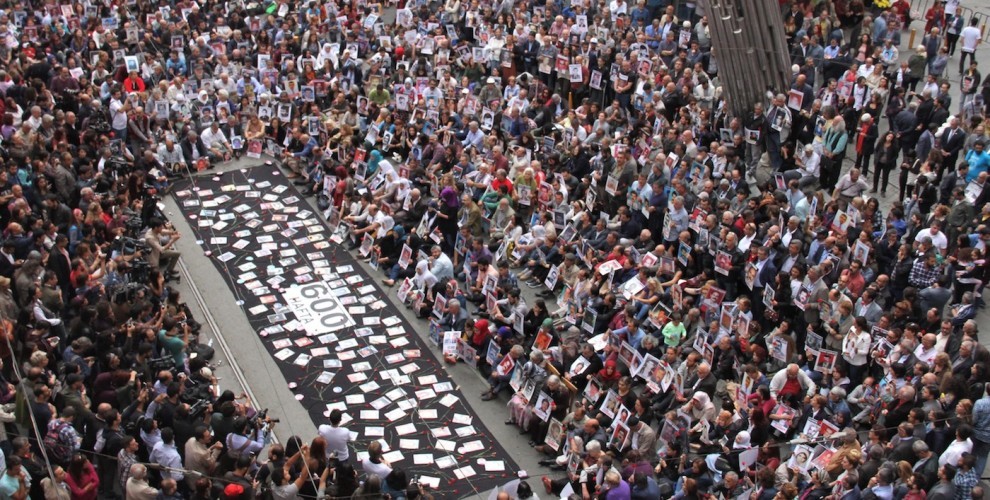Saturday Mothers: 700 weeks on
The longest ongoing civil disobedience action in Turkey is carried out by the relatives of the disappeared people
The longest ongoing civil disobedience action in Turkey is carried out by the relatives of the disappeared people

Today the longest ongoing civil disobedience action in Turkey will be carried out for the 700th week.
The Saturday Mothers, will be asking justice and the truth for the hundreds of disappeared people of Turkey and Kurdistan. Disappeared while in the hands of state forces.
It is impossible, even to the most distracted tourist gaze, avoid meeting eyes with the Mothers as they sit in Galatasaray square in Istanbul, the most well known and centric square of this wonderful city.
It is impossible not lowering the eyes on the photos lied out in front of these women, every Saturday.
And it is impossible passing by them without wondering what happened to all these young (and less young) men and women, whose life has been like frozen in that last picture.
You stop, you cannot pass by… and you listen. You listen to the Mothers telling every week the story of one of the disappeared people of Turkey and Kurdistan.
The Mothers have been, for 23 years, the living memory of a past that many would prefer to erase from the society’s collective memory.
They have been demanding justice, they have been demanding that those responsible, state officials at all levels, be brought to justice.
They have been demanding for the bodies and remains of those made forcibly disappeared by the state.
Some of the relatives sitting in Galatasaray square every Saturday were young, children, when they first joined, together with their mothers, the sit-in, 23 years ago.
Hasan Ocak had been taken into custody on 21 March 1995, Newroz day, in Istanbul. “That day - said Maside Ocak, Hasan’ sister - we were waiting for my brother in the house. But he did not return. He won’t ever return home”.
The family of Hasan learned that he had been taken into custody but the authorities denied arresting him.
For 58 days the family looked everywhere for him, knocked every door, but to no avail. Until “in the autopsy ward - Maside recalled - we found the photos of Hasan’s lifeless body. Those photos were terrible to watch. They had been taken, we learned later, on 26 March, five days after he had been arrested”.
Hasan’s body had been buried in the nameless graveyard in Beko. The family was able to excavate and get his body and his funeral was held in Gazi (a borough of Istanbul).
Maside recalls that together with Hasan’s photo, the family had been shown another photo, which they handed over to the Human Rights Association (IHD). “It soon turned out - said Maside - that it was the photo of Ridvan Karacocu. Five days after we buried Hasan, we buried Ridvan”.
Both Hasan and Ridvan had suffered terrible torture while in custody.
Convinced that those crimes carried out by the state should not go unpunished, the families of Hasan and Ridvan turned to Argentina, and saw the Mothers of Plaza de Mayo there, holding their demonstrations for years reclaiming their disappeared.
Thus, the Saturday Mothers sat in Galatasaray Square for the first time on 27 May 1995.
Hasan Ocak’s mother and Ridvan Karakoc’s mother stood there in the square with the photos of their children and demanded what happened to them.
“We were few back then, but the number of people joining us grew quickly”, said Maside.
Galatasaray has a huge importance for the families of the disappeared but for the whole society.
“The Saturday Mothers, the relatives of the disappeared, their friends, - said Maside - we all lived and shared in this square our biggest sorrows, together we tried to heal our wounds. It has been like growing a tree, giving birth to new branches over the years.
The families of the disappeared could continue to release their pain under this tree which is now big and strong. We did it for 23 years, we can continue to do it for another 100 years”.